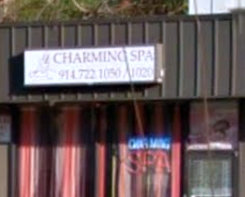 The Edgemont Community Council this week proposed landmark legislation that would effectively close massage parlors operating in the Town as houses of prostitution. The ten-page proposal was unanimously approved at the regular monthly meeting of the ECC’s directors held this past Monday, and submitted to the Town today.
The Edgemont Community Council this week proposed landmark legislation that would effectively close massage parlors operating in the Town as houses of prostitution. The ten-page proposal was unanimously approved at the regular monthly meeting of the ECC’s directors held this past Monday, and submitted to the Town today.
The legislation was prepared after Greenburgh Police Chief Chris McNerney told the ECC in October that because of a lack of effective regulation by the Town, Edgemont had become the illicit massage parlor capital of Westchester County.
ECC president Bob Bernstein, who drafted the measure, said a Google search for “adult massages” in Westchester showed advertisements for what appeared to be at least six illicit massage parlors in business on a short stretch of Central Avenue in Edgemont. He believes all would probably have to close if the legislation is adopted by the Greenburgh Town Board.
The ads all showed pictures of young, scantily clad women, most of whom appeared to be Asian with phone numbers across each picture. One ad offered “nice, pretty Korean/Japanese girl;” another ad offered “beautiful Asian masseuses” and “VIP service.”
Mr. Bernstein credited Edgemont resident David DePietto with spearheading the effort to get the Town to do something about the proliferation of illicit massage parlors in Edgemont. Mr. DePietto said that when he first started asking the Town to crack down on these establishments with new laws a few years ago, which the Town did not do, the number of such establishments in the Edgemont area has doubled. Mr. DePietto spoke in favor of the ECC’s proposal at the ECC meeting Monday night.
Town Supervisor Paul Feiner said today he would introduce the ECC proposal. However, it was unclear whether anyone else on the town board would second Mr. Feiner’s motion to introduce the measure. Without anyone willing to second the motion, the board will not be able to schedule a public hearing to consider whether to adopt the proposal. Mr. Feiner notably did not include adopting any law regulating massage establishments on his list of 50 “goals” for 2015.
Prior efforts by the ECC to get the Town to adopt legislation that the ECC has drafted have gone nowhere, either because no one seconded the measure when it was introduced or if it was seconded, the town board simply chose not to take it up.
Mr. Feiner had previously introduced a measure calling for a 120-day “moratorium” on the Town issuing permits for massage parlors to open. The ECC feared the supervisor’s proposal, which is scheduled for a public hearing next week, would do more harm than good in Edgemont because the Town doesn’t require any permits for massage parlors to open and that publicly calling for a moratorium on the issuance of permits that the Town doesn’t issue might encourage even more illicit massage parlors to open.
The proposed law would apply to all existing and all future massage establishments, but would exempt medical offices, private membership gyms, personal training facilities and other businesses that offer massage therapy.
As drafted, the intent is to give the Town the legal tools it needs to shut down all massage parlors operating illicitly as houses of prostitution, while preserving the right and reputation of legitimate massage establishments like Tranquility Spa and others to operate without fear of being lumped together with those that operate illicitly. The listed exemptions are aimed at making sure that only those businesses that need to be regulated are covered.
The proposed law requires all “massage establishments” in unincorporated Greenburgh that are not otherwise exempt to do two things as a condition for operating. First, they must obtain an annual license from the town clerk. The license requires a satisfactory background check by the police and the building inspector. Denial of the license is immediately appeal able to the town board.
If a license is issued, the massage establishment must then obtain a special permit to operate from the town board in a process that requires legal notice and and a public hearing.
Town Attorney Tim Lewis was given several months to draft the kind of law Chief McNerney said he was looking for, but did not do so, telling town board members that he does not think municipalities in New York are allowed to pass such laws.
The proposed law that Mr. Bernstein drafted was based in part on a law passed in 1996 by the Town of Clarkstown in Rockland and in part on a similar law adopted in 2013 by the Village of Farmingdale on Long Island. Neither law has been challenged.
The proposal also incorporates provisions in a Model Elements of Massage Parlor Ordinance that has been proposed by the Polaris Project, a national advocacy group that is trying to combat commercial sex networks using massage parlor fronts, which it says “represents one of the most widespread criminal sex trafficking networks in the United States “and exist in a majority of large urban areas and increasingly in suburban and rural areas as well.”
The proposal’s application requirements for obtaining a massage establishment license were taken almost verbatim from the Town’s own Cabaret Law, which was adopted in 1977.

